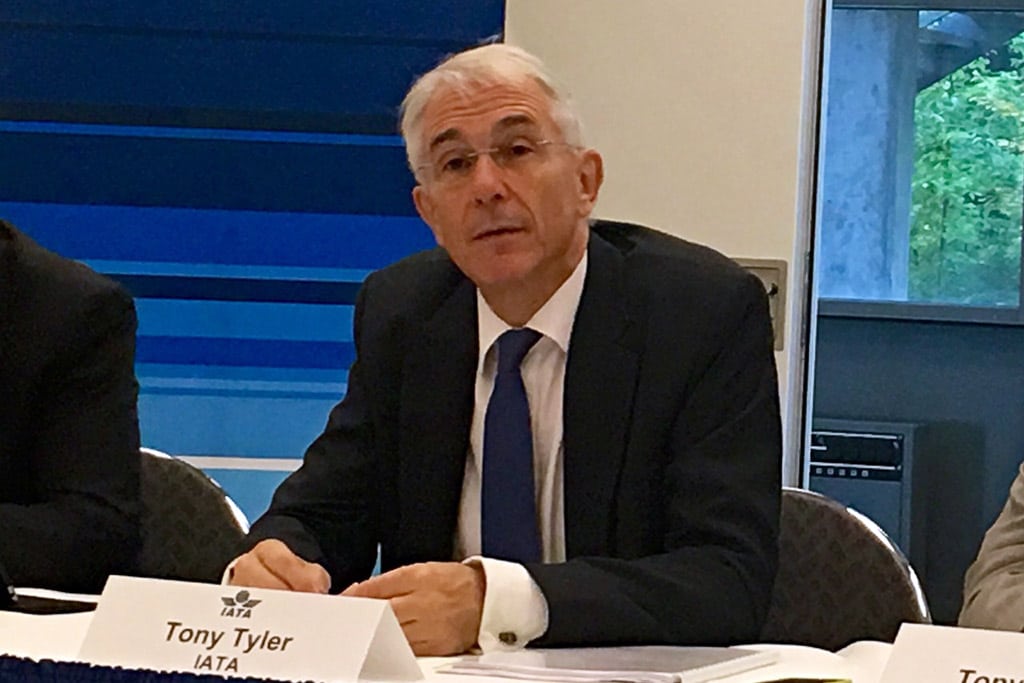Skift Take
We have to agree that there's no such thing as a free lunch, especially not on a plane. Airlines need to turn a healthy profit--and keep investors happy--to pay for product and service improvements. Even so, just saying everything is better doesn't make it so. Airlines will need to work on changing negative passenger perceptions, rather than pretending them away.
As he prepares to leave his post at the head of the world’s largest airline organization, IATA’s Director General, Tony Tyler, shared some wisdom with Skift on the sources of customer dissatisfaction with airlines, and what passengers have to look forward to over the next 20 years of aviation.
At IATA’s World Passenger Summit in Hamburg, we asked Tyler for his thoughts on the antagonism that exists between passengers and airlines. He considered our characterization of the relationship as antagonistic a tad too strong, but conceded there are issues. Still, Tyler feels the industry works hard to address passenger needs.
“To a very great extent,” he tells us, “you get what you pay for.” Tyler believes that’s what passengers want. “You have a wide choice of types of service and flexibility on ticketing conditions, which is as it should be.”
Ranging from bare-bones, ultra-low cost airlines to full-service and boutique carriers, which pamper passengers like royalty, aviation offers passengers the choice to pay for whatever level of service they desire, Tyler argues.
“The fact is that airlines are delivering fantastic value for money. They’re doing it in a way that is remarkably safe and secure and reliable,” he says.
While passengers in some of the world’s markets might be more keen to agree with Tyler than in others, the head of IATA argues that the industry delivers on the promise of improvements, though perhaps it does not address negative passenger perceptions effectively.
“In all markets, we’re seeing tremendous innovation and tremendous growth in capacity and networks,” he says. “Things sometimes go wrong, and when they do airlines need to be quick to recognize that they have a problem and be generous to fix it. Most airlines are. I think we do a terrific job, but we need to do a better job of explaining what a terrific job we’re doing, perhaps.”
Tyler points out that, over the past 30 years, airlines have had to adjust to a deregulated industry, greater integration of service across national borders, and the unstoppable rise of low-cost competitors. The success of these low-cost models would support Tyler’s arguments that passengers prefer paying less over getting more.
“It’s a fiercely competitive industry. To survive, airlines have act in a way that makes economic sense,” Tyler argues. “Getting high utilization of the assets is all part of that picture. But it is a very liberal market, and a market rich with innovations and possibilites. You can see it. It’s happening all the time. Airlines are all offering a range of services and products.”
The focus for now, and a big push at this year’s IATA World Passenger Summit, was IATA’s New Distribution Capability (NDC) proposal. Tyler argues that moving forward with an NDC platform would increase the choices available to passengers to customize their travel experience, picking those products and services they value most, regardless whether they book direct, online, or through traditional travel agents.
“The industry is offering a fantastic service to passengers NDC could help expand that innovation,” Tyler says. “One of the objectives is to let customers pick and choose with even more transparency, knowledge, and clarity the type of service that they’re getting and that they’re paying for.”
For the next 20 years, Tyler tells us, what passengers can expect from aviation is a smoother air travel experience, mainly benefiting from technology.
“Seamlessness is going to be the theme, and being connected throughout the experience, from arrival to return,” he says. “If you compare where we are now with where we were ten or fifteen years ago, it’s a lot smoother now, isn’t it? I just took a flight yesterday morning, where I had no checked baggage, so I walked through to the gate without interruption. At that hour of the morning, security was very quick and smooth. That is how things should be happening at airlines: nothing stopping you going from the curb to the seat on the aircraft. I think that’s where we’re going, where everything gets out of the way of the customer when travelling.”
Tyler sees a future of air travel where fully-connected passengers are informed of changes to travel plans instantaneously, where alternative hotel and transport arrangements are made without passenger intervention in the process. Such a future is not just a desire for the industry, he tells us, but a necessity to accommodate a projected doubling of passenger numbers by 2034.
“It’s not going to be possible to have that many passengers, not just at security, but throughout the whole service chain [without those improvements],” he says.
The Daily Newsletter
Our daily coverage of the global travel industry. Written by editors and analysts from across Skift’s brands.
Have a confidential tip for Skift? Get in touch
Tags: fees, iata, low-cost carriers
Photo credit: Tony Tyler at IATA's World Passenger Summit in Hamburg FCMedia
